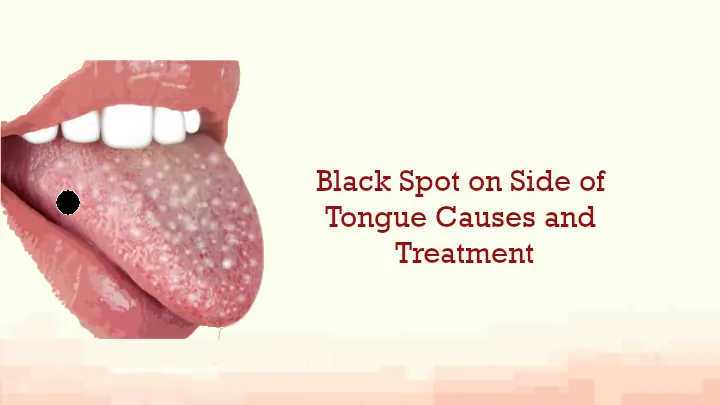Black Spot On Tongue Causes Revealed

The appearance of a black spot on the tongue can be a concerning and unsightly phenomenon, prompting many to seek out explanations and remedies. This condition, which may manifest as a single spot or multiple spots, can have various causes, ranging from harmless to more serious underlying health issues. Understanding the potential reasons behind a black spot on the tongue is crucial for addressing the condition effectively and, if necessary, seeking professional medical advice.
Introduction to Oral Health and Tongue Conditions
The tongue, a vital component of our oral health, plays a significant role in our ability to taste, speak, and chew food. Its surface is covered with small bumps called papillae, which house taste buds. The health and appearance of the tongue can reflect our overall well-being, with changes in color, texture, or the presence of spots often indicating underlying health conditions.
Possible Causes of Black Spots on the Tongue
Poor Oral Hygiene: One of the most common causes of black spots on the tongue is poor oral hygiene. When bacteria and dead cells accumulate on the tongue’s surface, they can lead to the formation of black spots. Regular brushing of the tongue with a tongue scraper or a toothbrush can help prevent this condition.
Oral Cancer: Although less common, a black spot on the tongue can be a symptom of oral cancer. This is more likely if the spot persists, grows, or is accompanied by other symptoms such as difficulty swallowing, unexplained bleeding, or a lump in the neck. If there’s any suspicion of oral cancer, it’s crucial to consult a healthcare provider immediately.
Hairy Tongue: A condition known as “hairy tongue” occurs when the papillae on the tongue’s surface become elongated, trapping bacteria and leading to discoloration. This can appear as black spots or a black, hairy appearance on the tongue. Hairy tongue is usually harmless and can be treated with improved oral hygiene and, in some cases, antifungal medications.
Nutritional Deficiencies: Deficiencies in vitamins like B12 or iron can lead to changes in the tongue’s appearance, including the formation of black spots. Ensuring a balanced diet or taking supplements can help alleviate these conditions.
Medication Side Effects: Certain medications, including those for high blood pressure, asthma, and some antidepressants, can cause changes in the tongue as a side effect. If a black spot on the tongue appears after starting a new medication, it’s worth discussing with a healthcare provider.
Smoking and Tobacco Use: Smoking and the use of tobacco products can lead to changes in the mouth, including the formation of black spots on the tongue. Quitting tobacco use can help prevent and possibly reverse these changes.
Fungal Infections: Fungal infections, such as those caused by Candida, can result in black spots on the tongue, especially in individuals with weakened immune systems. Antifungal medications can effectively treat these conditions.
Treatment and Prevention
Treatment for black spots on the tongue depends on the underlying cause. For most cases related to poor hygiene or minor conditions, improving oral hygiene practices can resolve the issue. This includes:
- Regular brushing of the teeth and tongue
- Using a tongue scraper to remove bacteria and dead cells
- Rinsing with mouthwash to reduce bacteria
- Maintaining a balanced diet rich in essential vitamins and minerals
For conditions related to nutritional deficiencies, medication side effects, or fungal infections, addressing the root cause under the guidance of a healthcare provider is necessary.
Conclusion
A black spot on the tongue, while often not a cause for immediate concern, should prompt an examination of one’s oral hygiene practices and overall health. By understanding the potential causes and taking proactive steps towards prevention and treatment, individuals can maintain good oral health and address any underlying issues that may lead to the appearance of black spots on the tongue.
FAQ Section
What are the common causes of black spots on the tongue?
+Common causes include poor oral hygiene, hairy tongue, nutritional deficiencies, medication side effects, smoking, and fungal infections.
How can I prevent black spots from forming on my tongue?
+Prevention can be achieved through regular oral hygiene practices, including tongue brushing, using a tongue scraper, maintaining a balanced diet, and avoiding tobacco products.
When should I seek medical attention for a black spot on my tongue?
+Seek medical attention if the spot persists, changes size or color, is painful, or is accompanied by other symptoms such as difficulty swallowing, unexplained bleeding, or a lump in the neck.
Can black spots on the tongue be a sign of a serious health condition?
+Yes, in some cases, black spots on the tongue can be a sign of a more serious underlying condition, such as oral cancer. It’s essential to have any persistent or concerning symptoms evaluated by a healthcare provider.
How are black spots on the tongue diagnosed?
+Diagnosis typically involves a physical examination by a healthcare provider, who may also ask questions about the patient’s medical history, symptoms, and lifestyle. In some cases, further testing may be necessary to rule out underlying conditions.
Can black spots on the tongue be treated at home?
+Mild cases related to poor hygiene can often be treated at home through improved oral hygiene practices. However, for conditions resulting from nutritional deficiencies, medication side effects, or infections, professional medical advice and treatment are recommended.